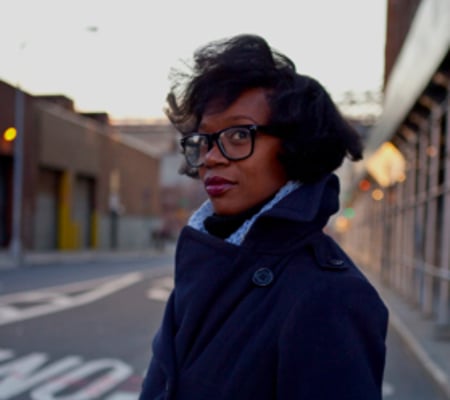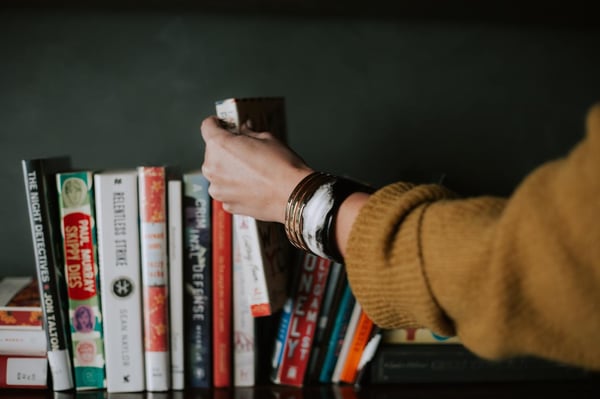At a time when politics and public thought feel fraught around the globe, opinion writing—and reading!—remind us all that we have a voice. That our voices matter. And that we can use the written word to not only share our perspectives but to galvanize change in pursuit of the future we desire.
From the discipline and joy of reading widely, to the habits of mind that allow us to recognize and question the views that define us, Op-Ed Guest Judge Syreeta McFadden—esteemed journalist and opinion writer—speaks elegantly about the nuance and depth of opinion writing in the Q&A below.
May her words empower and fuel you as you craft and hone your own.

In our Op-Ed Competition, young writers explored opinion writing as a way to use their voices to take a stand and ignite change in their communities. What draws you to the Op-Ed genre? Why does this style of writing speak to you?
A good op-ed helps readers, news consumers, make sense of the world. It gives some space, some air for readers to explore how a series of events shapes policy and narrative, and also helps readers reason solutions that might address structural and systemic problems that belie horrible news events. Great op-eds challenge readers to think and problem solve, shift perspectives, look at the top line news events and filter out the noise to really hone in on key issues that might move the conversation forward from reaction to thoughtful action.
Op-eds are the public square, where you can hear a society talking to itself and thinking through the measure and meaning of critical moments. I think that’s what draws me to the genre.
Your work engages critical themes of identity, equity, and (in)justice. And you’ve published in such a broad array of respected news outlets. What advice do you have for young writers hoping to similarly publish their work for a wider audience?
Trust your voice and read widely. Reading widely is very important. Viewpoints —nuanced viewpoints and critical perspectives—don’t just materialize out of nowhere. Reading smart folks across genres helps shape your own thinking. I think too many people underestimate how much thinking, rigorous research, goes into crafting a sensible, nuanced and smart op-ed that captures the energy and urgency of news events and cultural moments. Reading other writers who are actively engaged in the public discourse is crucial too. They can make you smarter, and they can also challenge your thinking, and they can also show you the flaws in groupthink —the dominant opinion or worldview by the public that can cause more harm than it ever intended. Oooh! Most important, ask yourself: what are we missing or what are we getting wrong about this story? Or a thing that’s happening in the world? Asking yourself questions helps a lot in writing.

When you consider your approach to writing, who (or what) inspires you? Are there authors, teachers, or texts that have informed or shaped your own work?
So I have a deep literary background that shapes a lot of my thinking. So… my favorite writers and thinkers of all time? James Baldwin, Joan Didion, Toni Morrison. l also love reading Rebecca Solnit.
Then there’s the smartest folks in journalism writing *right now* that you should always read to help parse out the meaning of the moment—Adam Serwer, Sarah Kendzior, Jamelle Bouie, Nikole Hannah Jones, culture writers Hannah Giorgis and Doreen St. Felix, Soraya McDonald, essayists Bassey Ikpi, Saeed Jones, Melissa Febos and Lacy Johnson, and then there’s Adrienne Maree Brown’s Emergent Strategy—a book I can’t recommend enough for creative thinking to tackle the crisis we’re facing right now. There’s more writers… but they’re the ones that come up for me first!
What motivated you to pursue writing as a career? Did you have any doubts?
I started writing when I was 8 years old. It took me a long time to accept that writing is more than just a hobby, that I am a storyteller and I like thinking and writing and world building to help make sense of this chaotic, brutal and beautiful world. I always had doubts.
I worked in a different career for many years but never stopped writing. That was the beginning of my realizing that this was a thing I really wanted to do. I wanted to tell stories, meaningful stories. I wanted to create something wonderful. There were a lot of adults who doubt that writing is more than just whimsy and not lucrative financially.
I write, to borrow from James Baldwin, because I must. Baldwin once said, “You write in order to change the world … if you alter, even by a millimeter, the way people look at reality, then you can change it.”… and I think that covers it for me.
What, in your mind, defines a winning Op-Ed?
I look for a compelling and nuanced argument befitting of the current moment, the zeitgeist, that challenges our vision to look beyond despair and reminds us to be empathetic humans. I hope to see some smart writing that helps us think and grow even under enormous hardship and limitation.
What are you working on right now? Anything we should keep our eyes out for in the coming months?
Right now? I’m slowly researching for a long term hybrid essay project. Who knows… but in the coming year(s) we’ll see the fruits of this labor alive in the world!





